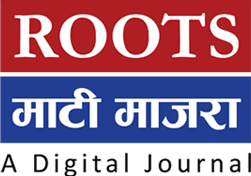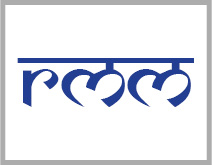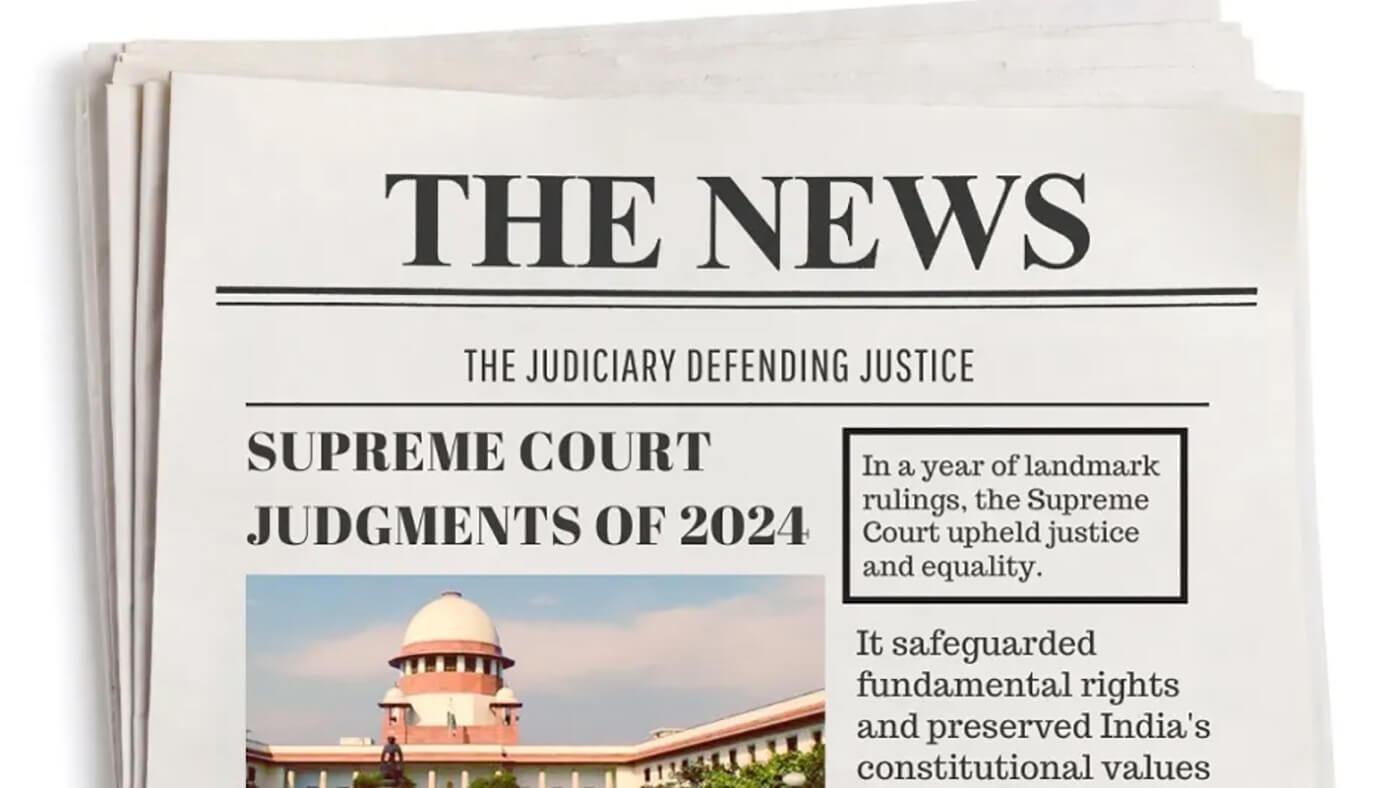Defending Justice: Landmark rulings that upheld equality and India’s constitutional values
The year 2024 has been a defining one for India, with the Indian higher judiciary, the Supreme Court reinforcing core Constitutional principles, ensuring that the rights enshrined within it remain robust and inviolable. In an era when an aggressive executive impinges on individual and collective rights and liberties, the Supreme Court has, in several cases, played a pivotal role in upholding the foundational ideals of justice, equality, and fairness
These 2024 judgments emphasise the protection of fundamental rights, including the right to life, dignity, equality before the law, and freedom from arbitrary state actions. Whether it be in the context of protecting the right to shelter, ensuring judicial oversight in executive actions, or reaffirming the presumption of innocence in criminal justice, the judgments affirm India’s commitment to constitutional safeguards. These rulings have sent a clear message that any infringement on these rights—be it by the state or any other authority—will be met with judicial scrutiny and, where necessary, corrective action. These decisions are not just legal victories but are symbolic of the Court’s role in holding the mighty Indian state accountable, ensuring that the protection of individual rights is never compromised in the pursuit of public order or convenience. Apart from the pronouncements that ensured personal liberty of journalists and politicians from the opposition, a significant ruling on bulldozer justice included stringent directions that has, so far at least, acted as a strong deterrent.
January
Supreme Court quashes remission for Bilkis Bano gang rape convicts- Upholding justice and rule of law
On January 8, the Supreme Court delivered a judgment in the Bilkis Bano case, quashing the Gujarat government’s premature remission of 11 convicts who had been sentenced for heinous crimes, including the gang rape of Bilkis Bano and the murder of seven family members during the 2002 Gujarat riots. Justices BV Nagarathna and Ujjal Bhuyan unequivocally held the remission order to be unlawful, highlighting procedural lapses and asserting that it violated the principles of rule of law. The Court criticised the Gujarat government’s complicity in granting the remission, which it termed an “instance of usurpation of the Maharashtra government’s authority” given the case’s transfer to Mumbai for a fair trial. The judgment marked a firm stance against arbitrary executive action and reaffirmed the victim’s rights within India’s criminal justice system.
The Court observed that the Gujarat government, backed by the Union Ministry of Home Affairs, acted with “unclean hands,” misled the Court, and disregarded due process in granting remission. Justice Nagarathna underscored that liberty under Article 21 must be exercised only in accordance with law, asserting that allowing the convicts to remain free would undermine public trust and violate the rule of law. The judgment ordered the convicts to surrender to custody within two weeks, asserting that their deprivation of liberty was justified based on their convictions and criminal conduct.
This ruling stands out as a monumental affirmation of judicial integrity, accountability, and victim-centric justice. Bilkis Bano’s relentless 20-year struggle, supported by human rights activists, faced numerous challenges, making this judgment a beacon of hope. By quashing the remission, the Supreme Court ensured that arbitrary decisions by the executive do not erode the foundations of justice, emphasising the judiciary’s role in safeguarding constitutional values and preserving public confidence in the rule of law.
February
Supreme Court strikes down electoral bonds scheme- Upholding transparency in political funding
In a pivotal ruling on February 15, the Supreme Court struck down the Electoral Bonds Scheme, 2017, declaring it unconstitutional. A five-judge Constitution Bench, led by Chief Justice of India DY Chandrachud, held that the scheme violated the fundamental right to information under Article 19(1)(a) of the Constitution. The judgment underscored that anonymous donation through electoral bonds infringed upon the public’s right to access information vital for participatory democracy, emphasising that transparency in political funding is indispensable for free and fair elections.
The bench addressed two key issues: the impact of anonymous donations on the right to information and whether unlimited corporate funding to political parties compromised electoral integrity. Striking down the scheme and related amendments to the Income Tax Act, Representation of People Act, and Companies Act, the Court held that such measures unjustly treated corporate and individual donor’s alike, enabling companies to exercise disproportionate influence over politics. Chief Justice Chandrachud further observed that the scheme failed the “least restrictive means” test, as less opaque methods could effectively address concerns about black money without undermining transparency.
The Court directed the State Bank of India to cease issuing electoral bonds and ordered disclosure of all donation details to the Election Commission of India, mandating publication by March 13. However, in a subsequent decision, another bench led by CJI Chandrachud refrained from initiating a criminal inquiry into allegations of quid pro quo arrangements tied to electoral bonds, stating the matter required further substantiation.
This judgment marked a watershed moment for electoral reform, reinforcing the democratic imperative for transparency in political funding. By dismantling a scheme that obscured the flow of money into politics, the Court affirmed its commitment to free and fair elections, even while leaving some accountability questions unresolved.
This judgment marked a watershed moment for electoral reform, reinforcing the democratic imperative for transparency in political funding. By dismantling a scheme that obscured the flow of money into politics, the Court affirmed its commitment to free and fair elections, even while leaving some accountability questions unresolved.
March
Supreme Court reverses 1998 PV Narasimha Rao judgment- A milestone against legislative corruption
On March 4, the Supreme Court overturned the 1998 PV Narasimha Rao judgment, which had controversially upheld immunity under Articles 105(2) and 194(2) of the Constitution for legislators receiving bribes linked to their vote or speech in the legislature. The seven-judge bench led by CJI DY Chandrachud rejected this interpretation, holding that parliamentary privileges cannot shield corruption. The Court clarified that immunity applies only to actions essential for legislative functions, not criminal acts like bribery, which undermine democratic values and probity in public life.
The judgment dismantled the earlier precedent that had paradoxically protected legislators who accepted bribes and voted accordingly but allowed prosecution of those who acted independently after accepting illicit gratification. Highlighting that corruption erodes the foundation of democracy, the Court emphasised that bribery is a punishable offence the moment illegal gratification is accepted, regardless of subsequent legislative actions.
This ruling is a landmark for its robust stand against corruption in public office. It upholds the principle that legislative privileges exist to foster free debate, not to shield malfeasance. By reaffirming accountability and rejecting immunity for bribery, the judgment reinforces public trust in democratic institutions and strengthens the fight against corruption in governance.
Supreme Court affirms freedom of speech, quashes criminal case against professor
On March 7, the Supreme Court upheld the fundamental right to freedom of speech and expression while quashing a criminal case against Professor Javed Ahmed Hajam, who faced charges under Section 153A of the erstwhile Indian Penal Code for his WhatsApp status criticising the abrogation of Article 370. A bench comprising Justices Abhay S. Oka and Ujjal Bhuyan observed that dissent and criticism of state decisions, such as describing the abrogation as a “Black Day for Jammu and Kashmir,” are integral to democracy and protected under Article 19(1)(a) of the Constitution. The Court asserted that such expressions, while critical, do not amount to promoting communal disharmony under Section 153A.
The ruling also criticised the Bombay High Court’s earlier refusal to quash the FIR against the professor, emphasising that dissent cannot be suppressed based on the reaction of individuals with “weak minds.” The Court noted, “If every criticism or protest of the actions of the State is to be held as an offence, democracy will not survive.” It further stressed the need to educate law enforcement on the nuances of free speech and reasonable restrictions, urging the sensitisation of police machinery to democratic values.
Significantly, the Court also addressed a second message shared by the professor, which celebrated Pakistan’s Independence Day. The bench clarified that extending goodwill to another country does not inherently promote disharmony and cautioned against imputing motives to individuals based solely on their religion. This ruling reaffirmed the judiciary’s role in safeguarding democratic principles, ensuring that freedom of speech remains robust and not stifled by overreach or misinterpretation of the law. By setting a precedent for protecting individual expression, this judgment reinforces the essence of dissent as a cornerstone of a thriving democracy.
March
Supreme Court declares arrest and remand of NewsClick founder Prabir Purkayastha illegal
On May 15, the Supreme Court, in a significant ruling, declared the arrest and remand of Prabir Purkayastha, the founder of NewsClick, to be illegal. A bench of Justices BR Gavai and Sandeep Mehta quashed the remand order issued on October 4, 2023, by the Delhi police, highlighting that the copy of the remand application had not been provided to the accused or his counsel prior to the remand order being passed. This failure to comply with the legal requirement rendered the arrest and subsequent remand invalid. The Court referenced its earlier judgment in Pankaj Bansal v. Union of India, emphasising the necessity of adhering to procedural safeguards in arrests.
Following the ruling, the Court ordered Purkayastha’s release from custody, contingent on his meeting the bail conditions set by the trial court, as the chargesheet had already been filed. While ASG Raju sought clarification regarding the authorities’ powers of arrest, Justice Gavai confirmed that the Court’s order did not restrict legal actions within the bounds of the law. Purkayastha had been incarcerated since October 2023, and this judgment provided a crucial safeguard for individuals detained under the Unlawful Activities (Prevention) Act (UAPA) without proper procedural protections.
This decision was pivotal in reaffirming the importance of due process and individual rights in cases of preventive detention. By setting aside the remand order and ordering Purkayastha’s release, the Supreme Court reinforced the need for accountability and transparency in the legal process, safeguarding the constitutional right to a fair trial and protection against unlawful detention.
July
Posthumous vindication: Supreme Court restores Rahim Ali’s Indian citizenship
On July 11, 2024, the Supreme Court delivered a significant judgment in the case of Rahim Ali, who had spent over a decade battling accusations of being a foreigner. Despite having passed away over two years earlier, Rahim Ali’s posthumous victory highlighted the deep struggles of many residents in Assam, caught in the ongoing citizenship crisis. The Supreme Court bench of Justices Vikram Nath and Ahsanuddin Amanullah quashed the Foreigners Tribunal’s decision that had declared him a foreigner, ruling that authorities cannot arbitrarily accuse individuals without material evidence to substantiate such claims. This judgment came after years of legal battles, where Ali’s name appeared in several voter lists, contradicting the accusations of illegal migration.
The case against Rahim Ali, initiated in 2004, was rooted in allegations of illegal migration from Bangladesh after the 1971 cut-off date. Despite presenting evidence of his family’s presence in Assam before the cut-off, Ali was declared a foreigner in 2012. He challenged the decision in the High Court and then in the Supreme Court, which ultimately recognised the absence of sufficient evidence for the accusations. The ruling not only vindicated his citizenship but also emphasised the need for credible and fair investigations into such serious allegations.
Rahim Ali’s case is a tragic example of how systemic issues in Assam’s citizenship process, including unfair legal procedures and arbitrary decisions, can devastate families. The Supreme Court’s judgment, although delivered too late for Ali himself, sets a precedent for future cases, ensuring that the rights of citizens are not disregarded without solid legal grounding. It underscores the importance of due process and the protection of fundamental rights, particularly in regions struggling with identity and nationality issues.
Supreme Court strikes down invasive bail condition, upholds right to privacy
In a significant decision, the Supreme Court ruled that bail conditions cannot infringe upon an accused’s right to privacy or subject them to continuous surveillance. The bench, comprising Justices Abhay S. Oka and Ujjal Bhuyan, examined the legality of a bail condition that required the accused to drop a pin on Google Maps for the police to access their location. The court held that such a condition, which would allow the police to constantly track the accused’s movements, violates the right to privacy protected under Article 21 of the Constitution.
The judgment emphasised that the primary purpose of bail is to ensure that the accused can remain free while awaiting trial, and that conditions should not impose undue restrictions on their liberty. The Court observed that conditions like constant surveillance would amount to a form of confinement, effectively undermining the very essence of granting bail. It also pointed out that the accused’s right to privacy cannot be compromised by arbitrary conditions set by the investigating agency.
In the specific case before the Court, involving Frank Vitus, a Nigerian national accused in a drug-related case, the bail condition requiring the accused to drop a location pin was found to be unnecessary. Inputs from Google LLC clarified that such a pin does not enable real-time tracking of the user, thus rendering the condition redundant. The Court ruled that imposing such a condition without technical consideration was unwarranted and directed its removal.
This ruling reinforces the balance between ensuring effective investigation and respecting individual rights, particularly the right to privacy.
August
Judgment on sub-classification of scheduled castes- A progressive step amidst criticism
On August 1, 2024, a landmark judgment by a 7-judge bench of the Supreme Court of India marked a pivotal moment in the evolution of reservations within Scheduled Castes (SC). The Court, by a majority of 6:1, ruled that sub-classification within the SC category is permissible, allowing for more nuanced quotas for historically underrepresented sub-groups. The seven-judge bench was led by Chief Justice of India DY Chandrachud and comprised Justices B R Gavai, Vikram Nath, Bela M Trivedi, Pankaj Mithal, Manoj Misra, and Satish Chandra Sharma. Notably, a dissenting minority judgment was delivered by Justice Bela Trivedi. The judgment overturned the 2005 decision in E.V. Chinnaiah v. State of A.P., which had held that SCs form a homogenous group and thus could not be subdivided. The Court’s ruling is poised to benefit certain marginalised sections of the SCs that remain disadvantaged despite the existing reservation framework.
However, the judgment also came with its share of controversy. While the majority opinion laid down that sub-classification could be done with empirical evidence to show the underrepresentation of certain groups, the decision included an unsolicited discussion on the “creamy layer” concept within SCs. This part of the judgment was met with strong criticism as it appeared to misapply the creamy layer criterion, which traditionally excludes more economically advanced individuals from availing of affirmative action benefits, to the SC category. Many argue that such an application overlooks the unique social and historical context of SCs, where even economically empowered members still face significant social stigma and discrimination.
This judgment was significant as it opened the door for further fine-tuning reservation policies to ensure that the most marginalised within the SCs are not overlooked. The ruling, however, also raised critical concerns regarding the potential for confusion and uneven implementation, especially with regard to the introduction of the creamy layer. While sub-classification can bring more targeted benefits, the introduction of the creamy layer without addressing its constitutional implications could undermine the very purpose of affirmative action. Despite these concerns, the decision was a progressive step towards improving the representation of underrepresented groups within India’s reservation system.




